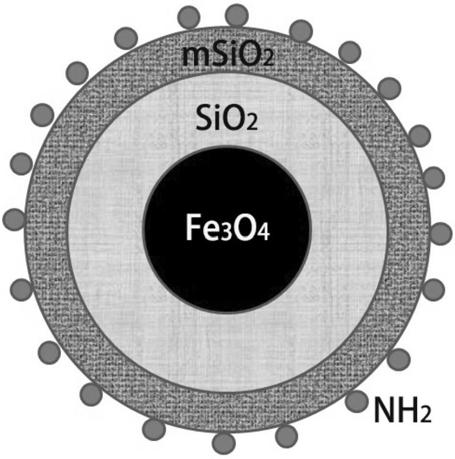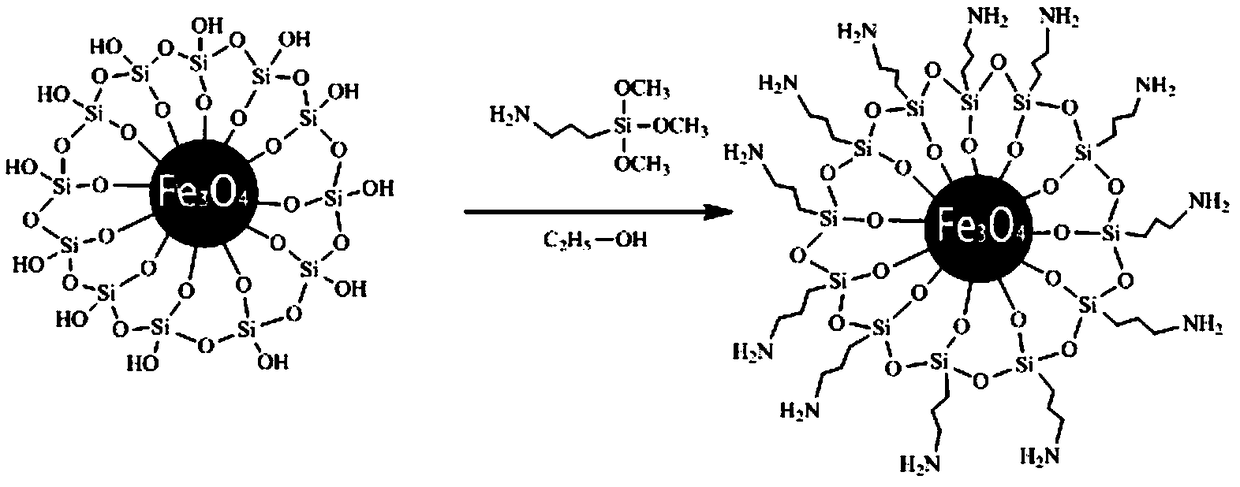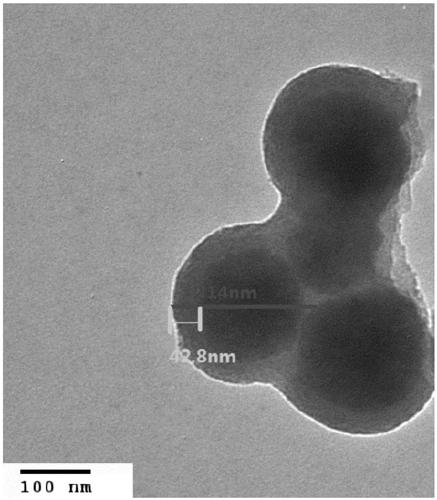Preparation and application of amino-modified fe3o4@sio2@msio2 composite particles with mesoporous structure
A technology of composite particles and amino modification, which is applied in the direction of silicon compounds, alkali metal compounds, and other chemical processes, can solve the problems of weak magnetism, decrease in adsorption capacity, and insufficient specific surface area of materials, so as to achieve good superparamagnetism and improve adsorption Ability, processing effect remarkable effect
- Summary
- Abstract
- Description
- Claims
- Application Information
AI Technical Summary
Problems solved by technology
Method used
Image
Examples
Embodiment 1
[0055] An amino-modified Fe with mesoporous structure 3 o 4 @SiO 2 @mSiO 2 A method for preparing composite particles, comprising the steps of:
[0056] Step 1: Use a certain amount of ethylene glycol as a solvent, dissolve the ferric ion compound and sodium acetate in ethylene glycol, add an appropriate amount of polyethylene glycol under the condition of magnetic high-speed stirring to continue stirring to obtain a mixed solution, and then transfer to In a high-pressure reactor, heat to a certain temperature to crystallize for several hours, then wash and dry to obtain Fe 3 o 4 The nanoparticle has a diameter of 120nm and a coercive force of 68.95emu / g.
[0057] Crystallization temperature: 200°C, crystallization time: 8h; stirring rate: 600r / min; the molecular weight of polyethylene glycol is required to be 20000; ferric chloride is added to the ethylene glycol solution with a concentration of 0.03mol / L; Anhydrous sodium acetate is 0.08g. The ferric ion compound is: ...
Embodiment 2
[0065] An amino-modified Fe with mesoporous structure 3 o 4 @SiO 2 @mSiO 2 A method for preparing composite particles, comprising:
[0066] Step 1: Preparation of Fe 3 o 4 @SiO 2 powder;
[0067] Step 1.1: Preparation of Fe 3 o 4 Nanoparticles: use ethylene glycol as a solvent, dissolve ferric nitrate and sodium acetate in ethylene glycol, add the concentration of ferric nitrate to 0.03mol / L, and the concentration of sodium acetate to 0.01mol / L after adding to the ethylene glycol solution, stir Then add polyethylene glycol and continue to stir to obtain a mixed solution. The molecular weight of polyethylene glycol is 20,000 to 40,000, and the addition amount is 0.002mol / L, and then transferred to a high-pressure reactor, heated and crystallized, and then washed and dried. Get Fe 3 o 4 Nanoparticles; among them: crystallization temperature: 180°C, crystallization time: 8-24h; stirring rate: 600-900r / min; obtained Fe 3 o 4 The diameter of the nanoparticles is 100-15...
PUM
| Property | Measurement | Unit |
|---|---|---|
| thickness | aaaaa | aaaaa |
| pore size | aaaaa | aaaaa |
| specific surface area | aaaaa | aaaaa |
Abstract
Description
Claims
Application Information
 Login to View More
Login to View More - R&D
- Intellectual Property
- Life Sciences
- Materials
- Tech Scout
- Unparalleled Data Quality
- Higher Quality Content
- 60% Fewer Hallucinations
Browse by: Latest US Patents, China's latest patents, Technical Efficacy Thesaurus, Application Domain, Technology Topic, Popular Technical Reports.
© 2025 PatSnap. All rights reserved.Legal|Privacy policy|Modern Slavery Act Transparency Statement|Sitemap|About US| Contact US: help@patsnap.com



